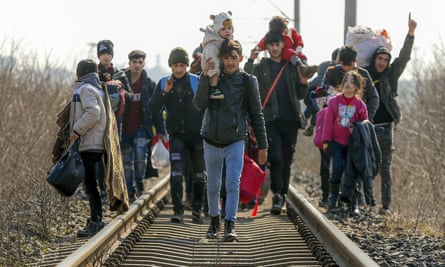A Brief Colonial History Of Ceylon(SriLanka)
Sri Lanka: One Island Two Nations
A Brief Colonial History Of Ceylon(SriLanka)
Sri Lanka: One Island Two Nations
(Full Story)
Search This Blog
Back to 500BC.
==========================
Thiranjala Weerasinghe sj.- One Island Two Nations
?????????????????????????????????????????????????Monday, March 2, 2020
Clashes as thousands gather at Turkish border to cross into Greece
EU border agency on ‘high alert’ as Turkish president Erdoğan keeps crossings open
Migrants walking toward Greece along a railway track near the Pazarakule border crossing in Edirne, Turkey, on Sunday. Photograph: Emrah Gürel/AP
Published onSun 1 Mar 2020 17.28 GMT
Migrants trying to reach Europe have violently clashed with Greek riot
police as Turkey claimed more than 76,000 people were now heading for
the EU as a result of President Recep Tayyip Erdoğan’s decision to open
the Turkish side of the border.
Teargas was fired at the migrants, some of whom were seen throwing
stones and wielding metal bars as they sought to force their way into
Greece at the normally quiet crossing in the north-eastern town of
Kastanies.
As the situation escalated, Turkey’s interior minister, Süleyman Soylu,
fuelled the anxiety in Greece and Bulgaria, which also shares a border
with Turkey, by tweeting on Sunday morning that 76,385 refugees had left
his country through Edirne, a province bordering the two EU member
states. There was no evidence provided for the claim.
Earlier in the day, the UN’s International Organization for Migration
said at least 13,000 people had gathered by Saturday evening at the
formal border crossing points at Pazarkule and İpsala, among others, in
groups of between several dozen and more than 3,000. The majority were
said to have been from Afghanistan.
Greek police confirmed that at least 500 people had arrived by sea on
the Greek islands of Lesbos, Chios and Samos close to the Turkish coast
within a few hours on Sunday morning.
The EU’s border protection agency, Frontex, said it was on high alert
and had deployed extra support to Greece, as the country’s prime
minister, Kyriakos Mitsotakis, held a meeting of his national security
council.
“We … have raised the alert level for all borders with Turkey to high,” a
Frontex spokeswoman said. “We have received a request from Greece for
additional support. We have already taken steps to redeploy to Greece
technical equipment and additional officers.”
Along the north-eastern mainland border, some migrants waded across a
shallow section of the Evros River to the Greek side. Witnesses said
there were groups of up to 30, including an Afghan mother with a
five-day-old infant.
Erdoğan opened his western border after an airstrike on Thursday night in Syria’s Idlib province killed at least 33 Turkish soldiers recently deployed to support the Syrian opposition.
The deaths came amid an escalation in fighting in north-west Syria
between Turkish-backed rebels and Russian-backed Syrian government
forces, leaving the risk of the two regional powers being brought into
direct confrontation.
The Turkish president had repeatedly said he would break his country’s
deal with Brussels to prevent migrants entering the EU unless he
received greater support from the 27 member states for his intervention
in Syria.
In a speech on Saturday, Erdoğan warned that he had no intention of
rethinking his decision. “What did we say? If this continues, we will be
forced to open the doors,” he told a meeting of the ruling Justice and
Development party.
“They did not believe what we said. What did we do yesterday? We opened
our border. The number of people crossing the doors to Europe reached
around 18,000 by Saturday morning, but today the number could reach 25
or even 30,000, and we will not close the passages during the period to
come.”
The EU has insisted it expects Ankara to abide by a €6bn (£5.2bn) deal
signed in 2016, under which Turkey agreed to halt the flow of people to
the EU in return for funds. Turkey hosts about 3.6 million refugees from
Syria.
The European council president, Charles Michel, spoke to Erdoğan on
Saturday. “The EU is actively engaged to uphold the EU-Turkey statement
and to support Greece and Bulgaria to protect the EU’s external
borders,” he said in a statement.
The Kremlin said on Sunday that it hoped Vladimir Putin and Erdoğan
would hold talks in Moscow on Thursday or Friday. On Sunday, Istanbul
police released Mahir Boztepe, the editor-in-chief of the Turkish
edition of Sputnik, the Russian news website. Boztepe had been held for
two hours as part of what the Ankara public prosecutor’s office said was
an investigation into whether Sputnik had been involved in “degrading
the Turkish people, the Turkish state, state institutions” and
“disrupting the unity and territorial integrity of the state”.

